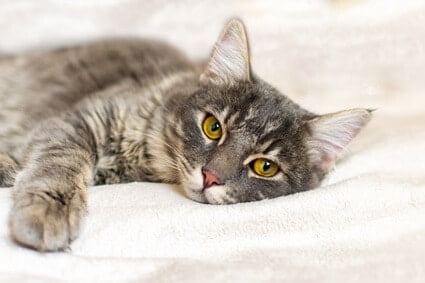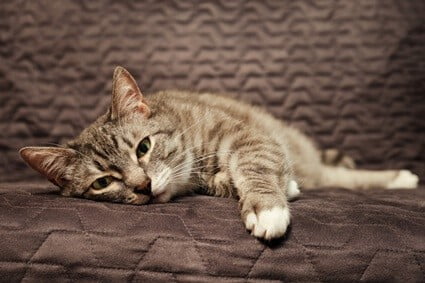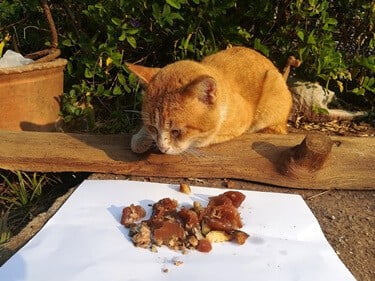Healthy cats can survive for about 1 week without food and just 3 days without water. However, a sick cat’s body is already weakened, so starvation and dehydration will magnify the adverse effects.
A sick cat shouldn’t go for more than 48 hours without food and 24 hours without water. Water is essential for digestion, waste removal, and circulation. Unless the cat gets replacement fluids and quality nutrition, its medical conditions will deteriorate, and it won’t be strong enough to recover.
If your cat is unwell, you’ll need to take a hands-on approach to encourage eating and drinking. Don’t just lay down food and water and hope for the best. If a poorly cat isn’t responding to your efforts, you should take them to see a veterinarian without delay.
How To Make A Sick Cat Eat and Drink
An unwell cat is unlikely to eat of its own accord, and inappetence is a generic health symptom.
Check for these symptoms, which may shed more light on what’s wrong with your cat:
| Symptoms | Medical Condition |
|---|---|
| Pawing at or swelling around the face: | Dental pain |
| Sneezing and streaming eyes or nose: | Respiratory tract infection |
| Chewing food and spitting it out: | Sore throat |
| Hiding and reluctance to engage: | Arthritis pain or stress |
| Rash and hives on the skin: | Serious allergic reaction |
| Vomiting and swollen abdomen: | Gastritis or intestinal blockage |
This is not an exhaustive list of health concerns that cause cats to lose their appetite. However, these are common reasons a cat won’t eat or drink.
Here are some further reasons why your cat has stopped eating.
How To Encourage Cats To Eat
Attempt to hand-feed your cat its usual meal as cats will enjoy the additional one-on-one attention.
Stimulate your cat’s sense of smell. While humans decide if food is appealing by sight, cats use scent. Even a sick cat will struggle to resist a strong-smelling meal that appeals to its senses.
Offer your cat some fish with a strong scent, such as sardines or tuna. Alternatively, drizzle tuna juice over your cat’s regular food. If your cat prefers meat, use gravy.
Consider slightly warming the food to release the scent and make it more appealing to the senses.
How To Get Cats To Drink Water
Convincing a cat to drink can be challenging as most cats are fussy about drinking water and teeter on the brink of dehydration when healthy. As hydration is vital to sick cats, you need to persevere.
Tips to encourage the drinking of water include:
- Leave water bowls throughout the house
- Half-fill the bowls
- Use a water purifier or bottled mineral water
- Add flavor to the water with tuna juice
- A running water source, such as a water fountain
Cats can be offered water through a syringe or given intravenous fluids, if necessary.
What Happens When a Cat Doesn’t Eat?
Food provides a cat with energy, so a sick cat will be weak and lethargic.
If a cat is not eating, it is not getting any protein. The amino acids in protein are the building blocks to countless essential functions in the feline body.
A cat with diarrhea is most at risk as they shed taurine through their waste. Taurine isn’t created organically, so it must be derived from food. If a cat’s not eating, it’ll experience a taurine deficiency.
Malnutrition
If your cat is sick and stops eating, it won’t be getting sufficient nutrients from food.
This will exacerbate the symptoms of an existing illness. A malnourished cat will lose weight quickly and appear very thin or skeletal.
Physical symptoms of malnutrition include:
- Muscular weakness
- Dry, scaly skin
- Lack of grooming
- Lethargy
- Swollen gums
- Loss of coordination
- Poor eyesight
The Journal of Feline Medicine and Surgery lists a reduction in metabolic function, wound healing, and immunosuppression as common signs and symptoms of malnutrition.

Hepatic Lipidosis (Fatty Liver Syndrome)
When a cat no longer eats food, its body processes fat reserves to stay alive.
Unfortunately, the liver will be unable to process fat efficiently. Fatty liver syndrome is unique to cats and is among the most common feline diseases of the liver.
The Journal of Veterinary Internal Medicine surveyed 77 cats with fatty liver syndrome, finding older cats most at risk. Also, it is connected to many illnesses, many of which list inappetence as a symptom.
Warning signs of hepatic lipidosis include:
- Vomiting and diarrhea
- Constipation
- Muscular weakness
- Inability to hold the head up
- Drooling
- Lethargy and depression
- Jaundice (yellowing skin and eyes)
What Happens When a Cat Does Not Drink?
Water is even more time-critical to a sick cat than food.
If a cat becomes dehydrated, its internal organs will start to falter. Water is essential for flushing toxins from the body, resulting in kidney problems.
If your cat already has diabetes or renal failure, it’ll urinate more frequently. Consequently, the effects of not drinking water will manifest sooner and have more dire consequences.
Dehydration
Dehydration is the most obvious concern when a cat doesn’t drink. Water helps the blood flow around a cat’s body, keeping the organs working optimally.
This will lead to various health problems, including constipation, sunken eyes, dry mouth, lethargy, and an accelerated heart rate.
A sick cat may have a fever, so its higher body temperature will increase its need to hydrate. Sick cats may experience vomiting and diarrhea, purging a cat’s body of stored water.
You can check for dehydration by pinching the skin at the nape of its neck. A cat’s skin should be elastic and go back into place immediately. If the cat is dehydrated, the skin will remain in a tent position or slowly fall back into place.

Acute Kidney Failure
Among the biggest risks of dehydration in cats is acute renal failure, which occurs when a cat’s kidneys suddenly cease function. Unlike chronic renal failure, this condition can be reversed.
The Journal of the American Veterinary Medical Association stated that renal failure is linked to cardiac ischemia (reduced blood flow and oxygen to the heart muscle). Ischemia occurs when an inadequate supply of blood reaches the internal organs.
If your cat is already unwell, its body will struggle to process waste and toxins, giving the kidneys more work to do.
Symptoms of acute kidney failure include:
- Vomiting and diarrhea, often containing blood
- Foul-smelling breath
- Changes to the frequency of urination
- Seizures
- Confusion
- Nausea
- Fluid retention
Acute kidney failure requires dialysis to restore fluids to the body intravenously. The consequences of this condition will depend on the cat’s age, health status, and how soon the problem is resolved.


My sr kitty is actively dieing. He’s not eating or drinking urinated only once in last 24 hours. Occasionally throws his head back and gets stiff opens his eyes and lets out one single bellow moan. What is this? It lasts only second. No shaking or trembling
Hi Dona, my 18 yo cat is doing the same thing but nothing to eat for 2 days. Very few sips of water and peeing whenever and anywhere. She’s unsteady and lays in one position but will move around occasionally. She makes no noise unless bothered and it’s a little meow.
We took her to the vet and they think she’s in the process of passing and offered to help us out. Not yet. Just not sure.